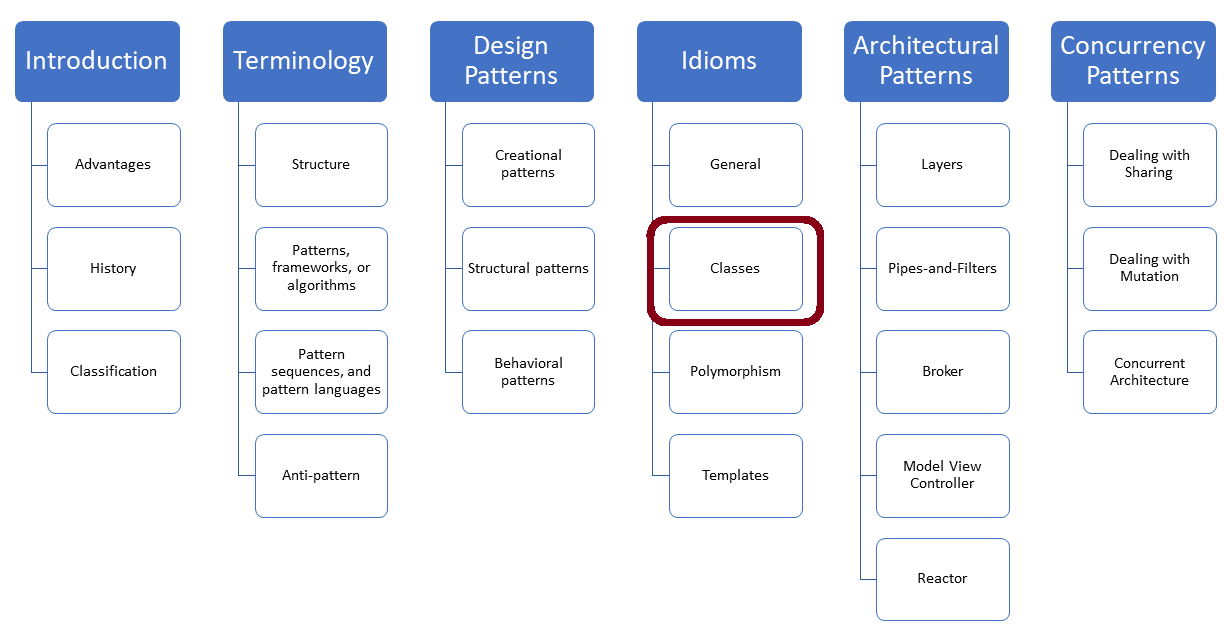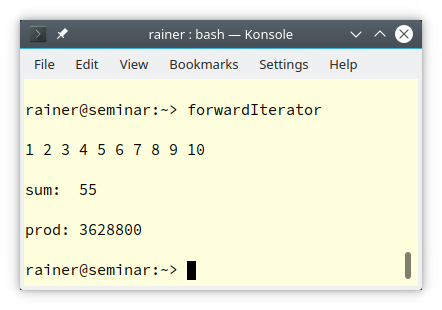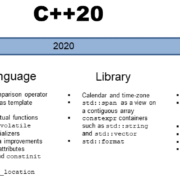The Iterator Protocol
When you want to use a user-defined type in a range-based for-loop, your user-defined type has to implement the Iterator Protocol.

Here is the question I want to answer: What interface must a user-defined type support to be usable in a range-based for-loop.
Requirements of a Range-Based for-Loop
Let me start with a simple experiment and use std::array in C++ Insights. Here is a simple example:
// iteratorProtocol.cpp #include <array> int main() { std::array<int, 5> myArr{1, 2, 3, 4, 5}; for (auto a: myArr) a; }
C++ Insights creates the following code out of it:
#include <array> int main() { std::array<int, 5> myArr = {{1, 2, 3, 4, 5}}; { std::array<int, 5> & __range1 = myArr; int * __begin1 = __range1.begin(); int * __end1 = __range1.end(); for(; __begin1 != __end1; ++__begin1) { int a = *__begin1; a; } } return 0; }
Let me write it more generally: When you use a range-based for-loop (for(range_declaration : range_expression)), the compiler creates the following code:
 Modernes C++ Mentoring
Modernes C++ Mentoring
Do you want to stay informed: Subscribe.
{
auto && __range = range_expression ;
auto __begin = begin_expr;
auto __end = end_expr;
for (;__begin != __end; ++__begin) {
range_declaration = *__begin;
loop_statement
}
}
I marked the essential parts in red:
-
begin_exprandend_expr: return an iterator object - Iterator object
operator++: incrementing the iteratoroperator*: dereferencing the iterator and accessing the current elementoperator!=: comparing the iterator with another iterator
begin_expr and end_expr call the essential begin and end on the range_expression. begin and end could either be member functions or free functions on range_expression.
Let me apply the theory and create a number generator.
A Generator
My first implementation supports the Iterator Protocol
The Iterator Protocol
The following class Generator supports the elementary Iterator Protocol.
// iterator.cpp #include <iostream> class Generator { int begin_{}; int end_{}; public: Generator(int begin, int end) : begin_{begin}, end_{end} {} class Iterator { int value_{}; public: explicit Iterator(int pos) : value_{pos} {} int operator*() const { return value_; } // (3) Iterator& operator++() { // (4) ++value_; return *this; } bool operator!=(const Iterator& other) const { // (5) return value_ != other.value_; } }; Iterator begin() const { return Iterator{begin_}; } // (1) Iterator end() const { return Iterator{end_}; } // (2) }; int main() { std::cout << '\n'; Generator gen{100, 110}; for (auto v : gen) std::cout << v << " "; std::cout << "\n\n"; }
The class Generator has member functions begin and end, (lines 1 and 2) returning iterator objects, initialized with begin_ and end_. begin_ and end_ stand for the range of created numbers. Let me analyze the inner class Iterator which keeps track of the generated numbers:
operator*returns the current valueoperator++increments the current valueoperator!=compares the current value with theend_marker.
Finally, here is the output of the program:

Let me generalize the iterator returned by begin() and end() and make it a forward iterator. Afterward, the class Generator can be used in most of the algorithms of the Standard Template Library. To put it differently, the unordered associative containers support a forward iterator.
A Forward Iterator
The following improved Generator has an inner class Iterator that is a forward iterator.
// forwardIterator.cpp #include <iostream> #include <numeric> class Generator { int begin_{}; int end_{}; public: Generator(int begin, int end) : begin_{begin}, end_{end} {} class Iterator { using iterator_category = std::forward_iterator_tag; // (1) using difference_type = std::ptrdiff_t; using value_type = int; using pointer = int*; using reference = int&; int value_{}; public: explicit Iterator(int pos) : value_{pos} {} value_type operator*() const { return value_; } pointer operator->() { return &value_; } // (2) Iterator& operator++() { ++value_; return *this; } Iterator operator++(int) { // (3) Iterator tmp = *this; ++(*this); return tmp; } // (4) friend bool operator==(const Iterator& fir, const Iterator& sec) { return fir.value_ == sec.value_; } friend bool operator!=(const Iterator& fir, const Iterator& sec) { return fir.value_ != sec.value_; } }; Iterator begin() const { return Iterator{begin_}; } Iterator end() const { return Iterator{end_}; } }; int main() { std::cout << '\n'; Generator gen{1, 11}; for (auto v : gen) std::cout << v << " "; // (5) std::cout << "\n\n"; // (6) std::cout << "sum: " << std::accumulate(std::begin(gen), std::end(gen), 0); std::cout << "\n\n"; // (7) std::cout << "prod: " << std::accumulate(gen.begin(), gen.end(), 1, [](int fir, int sec){ return fir * sec; }); std::cout << "\n\n"; }
First, Iterator needs several type aliases in the following member function declarations. Additionally, to the previous Iterator implementation in the program iterator.cpp, the current Iterator supports the following member functions: the arrow operator (operator-> in line 2), the post-increment operator (operator++(int) in line 3), and the equal operator (operator== in line 4).
That was it already. Now, I can use my improved Generator still in a range-based for-loop (line 5), but also in the STL algorithm std::accumulate. Line 6 calculates the sum of all numbers from 1 to 10; line 7 does a similar job by multiplying numbers from 1 to 11. In the first case, I choose the neutral element 0 for the summation, and in the second case the neutral element 1 for the multiplication.
There is a subtle difference between the first and the second call of std::accumulate. The first call uses the non-member functions std::begin and std::end on the Generator: std::accumulate(std::begin(gen), std::end(gen), 0), but the second call the Generator's member functions begin() and end() directly which I implemented.
Finally, here is the output of the program:
What’s Next?
In my next post, I will write about the Covariant Return Type. The Covariant Return Type of a member function allows an overriding member function to return a narrower type. This is particularly useful when you implement the creational design pattern Prototype.
Thanks a lot to my Patreon Supporters: Matt Braun, Roman Postanciuc, Tobias Zindl, G Prvulovic, Reinhold Dröge, Abernitzke, Frank Grimm, Sakib, Broeserl, António Pina, Sergey Agafyin, Андрей Бурмистров, Jake, GS, Lawton Shoemake, Jozo Leko, John Breland, Venkat Nandam, Jose Francisco, Douglas Tinkham, Kuchlong Kuchlong, Robert Blanch, Truels Wissneth, Mario Luoni, Friedrich Huber, lennonli, Pramod Tikare Muralidhara, Peter Ware, Daniel Hufschläger, Alessandro Pezzato, Bob Perry, Satish Vangipuram, Andi Ireland, Richard Ohnemus, Michael Dunsky, Leo Goodstadt, John Wiederhirn, Yacob Cohen-Arazi, Florian Tischler, Robin Furness, Michael Young, Holger Detering, Bernd Mühlhaus, Stephen Kelley, Kyle Dean, Tusar Palauri, Juan Dent, George Liao, Daniel Ceperley, Jon T Hess, Stephen Totten, Wolfgang Fütterer, Matthias Grün, Ben Atakora, Ann Shatoff, Rob North, Bhavith C Achar, Marco Parri Empoli, Philipp Lenk, Charles-Jianye Chen, Keith Jeffery, Matt Godbolt, Honey Sukesan, bruce_lee_wayne, Silviu Ardelean, schnapper79, Seeker, and Sundareswaran Senthilvel.
Thanks, in particular, to Jon Hess, Lakshman, Christian Wittenhorst, Sherhy Pyton, Dendi Suhubdy, Sudhakar Belagurusamy, Richard Sargeant, Rusty Fleming, John Nebel, Mipko, Alicja Kaminska, Slavko Radman, and David Poole.
| My special thanks to Embarcadero |  |
| My special thanks to PVS-Studio |  |
| My special thanks to Tipi.build |  |
| My special thanks to Take Up Code |  |
| My special thanks to SHAVEDYAKS |  |
Modernes C++ GmbH
Modernes C++ Mentoring (English)
Rainer Grimm
Yalovastraße 20
72108 Rottenburg
Mail: schulung@ModernesCpp.de
Mentoring: www.ModernesCpp.org




Leave a Reply
Want to join the discussion?Feel free to contribute!